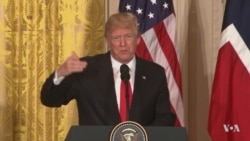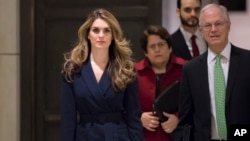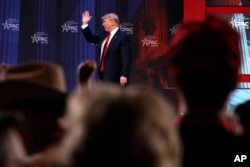In recent weeks, the investigation into possible collusion between President Donald Trump’s presidential campaign and Russia has intensified, raising the prospect that the probe could become an issue in advance of the November midterm congressional elections.
Former Trump campaign manager Paul Manafort made another appearance in federal court in Washington Wednesday, where he pleaded not guilty to the latest round of charges brought by special counsel Robert Mueller.
WATCH: Russia Probe Intensifies as Trump Complains About 'Witch Hunt'
Last week, Rick Gates, Manafort’s former deputy, pleaded guilty to lying to prosecutors and is now cooperating with the investigation.
In mid-February, 13 Russians were indicted in connection with election meddling, which deputy attorney general Rod Rosenstein described as an effort to “promote discord in the United States and undermine public confidence in democracy. We must not allow them to succeed.”
Hicks testifies
Congressional inquiries also continue. Hope Hicks, the White House communications director and a longtime Trump aide, was the latest figure to testify before a congressional committee on the Russia probe.
Hicks declined to answer some questions before a closed session of the House Intelligence Committee, frustrating several Democrats.
“This is not executive privilege. This is executive stonewalling,” said ranking committee Democrat Rep. Adam Schiff.
Witch hunt
But there was more pushback from the White House this week. President Trump fired off a series of tweets dismissing the probe as a “WITCH HUNT.”
“They have had this phony cloud over this administration, over our government,” Trump told reporters at the White House last month. “And it has hurt our government, it does hurt our government. It is a Democrat hoax.”
Democrats reject that view, including Sen. Mark Warner, the top Democrat on the Senate Intelligence Committee.
“I continue to believe that this is the most important thing that I will work on in my whole public career, and getting the whole truth out is extraordinarily important,” he said.
Political cloud
Warner’s committee is also investigating possible collusion between the Trump campaign and Russia, an issue that has cast a cloud over the White House since Trump took office.
“I think it is a significant threat,” said Northeastern University analyst Costas Panagopoulos, via Skype. “We don’t know what that investigation is going to turn up. We don’t know how serious these findings will be for the president.”
Concerns about the investigation could further erode Trump’s historically low approval ratings in the runup to this year’s congressional elections, according to Brookings Institution expert John Hudak.
“And if Republicans lose the House and/or the Senate in 2018, it is going to mean a disastrous finish to the last two years of Trump’s first term.”
Trump’s approval averages just more than 40 percent in recent polls. Presidents with approval ratings of less than 50 percent can leave their party vulnerable during midterm elections. On average, the president’s party has lost about 30 House seats in midterms going back to the U.S. Civil War.
Base unmoved
So far though, the probe seems to be having little impact on Trump’s core supporters. For example, it got little attention at last week’s Conservative Political Action Conference, where the president was a featured speaker.
“The so-called Russia investigation is less of a negative draw on President Trump and his administration and their attention than many of his opponents would like it to be,” said conservative analyst Michael Barone of the American Enterprise Institute.
For the most part, opinion polls have found the public still believes the probe is worthwhile. A recent CNN poll found that 61 percent of those surveyed believe the Russia investigation is a serious matter, while 34 percent said it was mainly an effort to discredit Trump.
A Suffolk University/USA Today poll found that 75 percent of those asked took the charges of Russian meddling in the election either very or somewhat seriously. Twenty percent said they took it either not very seriously or not seriously at all.










